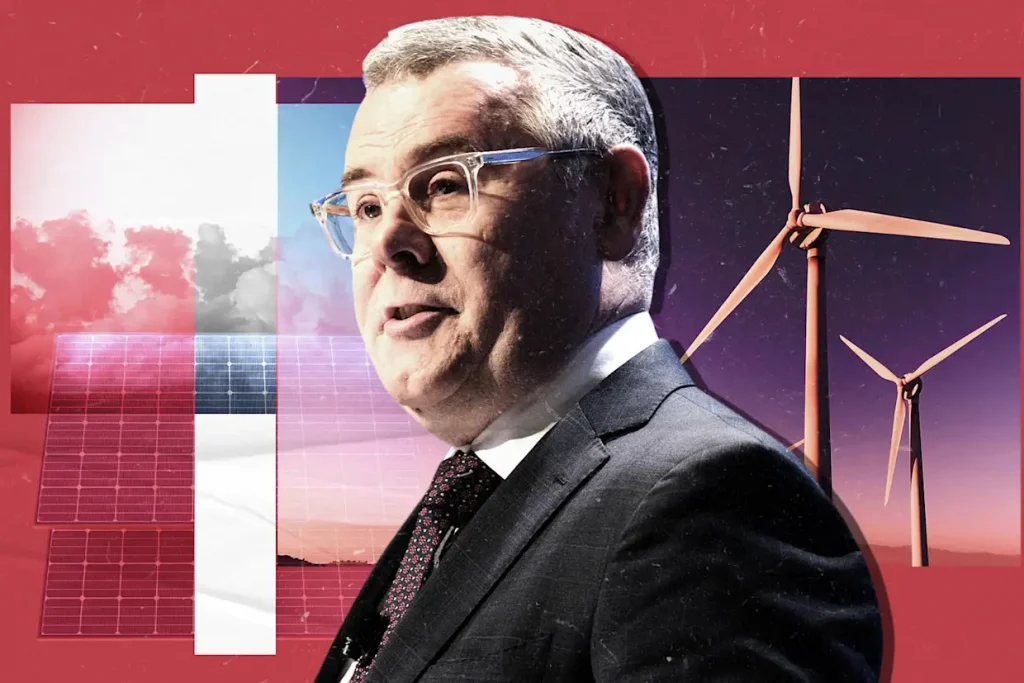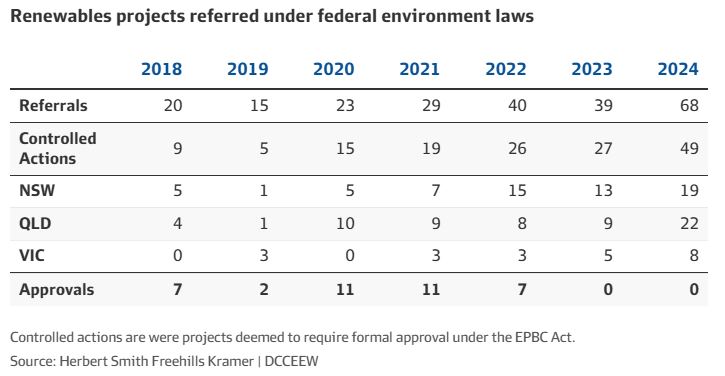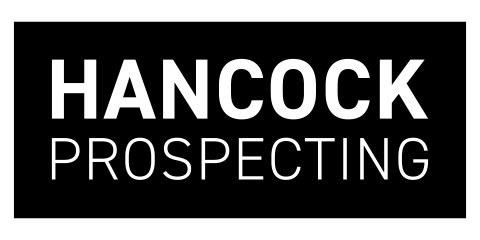
Article by Ronald Mizen and Ryan Cropp, courtesy of Financial Review
08.08.2025
Not one of the 76 renewables projects needing federal environmental assessment in NSW, Victoria or Queensland in 2023 or 2024 has received final approval, as “green tape” regulation continues to undermine Labor’s clean energy and productivity agenda.
Analysis prepared by top-tier law firm Herbert Smith Freehills Kramer showed 27 projects in 2023 and 49 projects in 2024 were deemed “controlled actions” needing the tick of approval under the federal Environment Protection and Biodiversity Conservation Act. As of last Thursday, none have received the final go-ahead, the law firm said.

The bottlenecks show the scale of the task facing federal Environment Minister Murray Watt, who has been given just over 18 months to overhaul Australia’s environmental laws and satisfy the demands of both industry, who require shorter and clearer timelines, and green groups, who want stronger nature protections.
The urgency of environmental law reform – which former Treasury secretary Ken Henry has identified as Australia’s top productivity challenge – is likely to be among the priority outcomes of the government’s Economic Reform Summit later this month.
An attempt by Watt’s predecessor, Tanya Plibersek, to resolve the impasse during Labor’s first term ran aground earlier this year amid pressure from the mining sector in Western Australia, where the government was chasing votes ahead of the May 3 election.
Business Council of Australia chief executive Bran Black said the status quo for getting projects approved in Australia was “simply not working”.
“In fact, it’s an active handbrake to new investment into our economy,” Black said. “Right now, the single biggest opportunity being held up by sluggish EPBC processes is the rollout of renewable energy projects, so if we’re serious about delivering net zero by 2050, then these processes need an overhaul.”
Labor has a plan to have 82 per cent of Australia’s electricity produced by renewable sources by 2030, which underpins its bid to reduce emissions by 43 per cent on 2005 levels by the same date. However, on the current trajectory, the government is likely to fall well short of its target.
Other data compiled by the federal environment department showed that across 242 renewable projects deemed controlled actions – an activity that may have significant effect on something of national environmental importance – and needing an EPBC approval in the past 25 years, just 73 have received it.
There were 27 projects deemed controlled actions in the first six months of 2024-25, more than the total referrals for mining and non-renewable energy projects combined, yet there were just five approvals, which came from prior years.
Watt, who is seen by Anthony Albanese as an effective minister with an ability to cut deals, was put in the environment portfolio with a mandate to find a way through Australia’s environmental law reform quagmire.
He has hit the ground running since being appointed to the role, initiating an extensive consultation process with both industry and environment groups within two months of Labor’s election victory.
A review of the laws by former competition regulator Graeme Samuel in 2020 recommended a new national set of rules to replace the current overlapping or duplicating system of state and federal approvals processes.
Samuel recommended a “single touch” system, whereby the states and territories would be accredited to assess and determine environmental approvals under a strict set of Commonwealth-mandated standards and rules.
Opposition Leader Sussan Ley, who was environment minister at the time of the Samuel review, has also indicated she is open to doing a deal with the government on EPBC reform, as a signal of her intention to bring the Coalition back to the political centre.
Richie Merzian, chief executive of the Clean Energy Investor Group, said there had been a significant increase in renewable projects referred to the EPBC and in the time taken to assess them.
“Right when we need the renewables rolled out at speed and scale, to both meet the government’s targets and replace retiring coal, the clean energy proposals are bogged down in the EPBC process,” Merzian said.
“Coupled with other delays, this is making international investors, who make up the majority of clean energy owners in Australia, skittish about deploying capital here.”
Delays can be caused by a range of factors, including the time taken by project proponents and states to submit necessary information to the federal government.

In response to questions about the HSFK analysis, Watt acknowledged the flaws in the existing laws and his intention to pass new legislation through the parliament by the end of 2026.
Watt also talked up 95 new renewables projects being approved since Labor came to office in 2022.
“Our reforms will seek to better protect our environment, while delivering more efficient approvals for renewables and other industries,” he said.
Renewable energy industry executives met in Sydney on Friday for one of 41 pre-summit roundtables to feed into the main event from August 19-21.
In a draft report on the net zero transition prepared ahead of the summit, the Productivity Commission last week recommended the environment minister be given more leeway to fast-track approvals for renewables projects by being able to consider the urgency of the net zero transition.
This would not mean “a free pass” for renewables projects, the PC said, but “an explicit reference to the energy transition would nevertheless highlight its importance and ensure it was properly considered”.
This sparked fierce opposition from the Labor Environment Action Network, a large and powerful rank-and-file movement within the party.
LEAN national co-convenor Felicity Wade said for an industry already challenged with social licence issues, claiming special dispensation from environmental protections was a pathway to entrenching trouble.
“The act already requires decision makers to consider economic and social matters; the transition is fully covered in this provision,” Wade said.
“LEAN backs reform to deliver faster approvals, but not at the expense of environmental outcomes. LEAN has been central to the development of Labor’s climate change policies, but we don’t think the transition needs to come at the expense of our natural heritage.”



